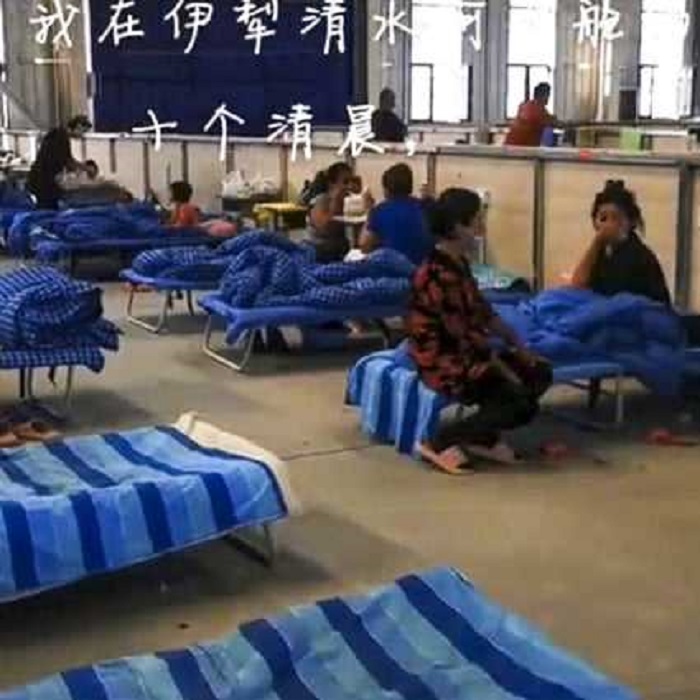
Residents in part of the western Xinjiang region have taken to social media to complain of serious shortages of food and supplies after more than a month of Covid-19 restrictions.
The Ili Kazakh autonomous prefecture – an area in the north of Xinjiang that is home to 4.5 million people – has been under lockdown since early August after an outbreak there, according to posts on microblogging site Weibo. There has been no official announcement about the Ili Kazakh prefecture being locked down.
The authorities are struggling to contain recent outbreaks, with millions also confined to their homes in other parts of China as Beijing seeks to avoid a major surge of infections ahead of the Communist Party’s national congress – a key political gathering in mid-October.
On Friday (Sept 9), health authorities reported 259 new symptomatic local cases and 1,033 asymptomatic infections. Of those, three local and 27 asymptomatic cases were in Xinjiang.
Beijing has discouraged citywide lockdowns to avoid a repeat of the food and medicine shortages seen in Shanghai in April. But according to a number of social media posts in the past few days, many residents of the Ili Kazakh prefecture have been confined to their homes and say they have run out of food and other supplies.
A statement posted on the official Weibo account of the Xinjiang Procuratorate on Wednesday said 19 officials from Yining – the capital of Ili Kazakh prefecture – had been punished for failing to control the movement of people and other negligence, which had resulted in Covid-19 spreading.
Some residents have complained about food shortages becoming acute in the prefecture in recent days, with one post on Weibo showing a Uygur man in tears because his three children had not eaten for days. Others said they could not get access to medical care, with one post including a photo of a Uygur boy with a high temperature waiting for treatment. Neither post could be verified independently.
Both Han Chinese and ethnic minority residents have complained about food shortages online. Han Chinese account for about 40 per cent of the population in the prefecture, with Kazakhs making up about 27 per cent, and Uygurs about 18 per cent.
One video posted to Weibo that has since been removed showed a man standing on a window ledge shouting “I’ve had enough”. Another video showed a couple and their newborn baby outside their residential complex at night, unable to return home after the woman had given birth in a hospital.
Some have also complained on social media about conditions in makeshift hospitals used for quarantine, where a large number of people appear to have been sent.
The complaints on social media – challenging the censors – are in stark contrast to the official picture.
According to health authorities in Yining, there were just 11 asymptomatic cases reported in the city on Friday. And Xinjiang authorities were last week promoting Yining’s tourist attractions, urging people to visit.
Social media users have raised questions about what is really going on in the prefecture.
“We all thought Ili had lifted the lockdown and the local government has even begun to promote tourism – but the fact is people are locked at home and the five-day lockdown cycle is being repeated over and over again,” a popular Beijing-based blogger wrote on Weibo. “It’s so strange that [posts on] the Ili outbreak and Xinjiang outbreak … have drawn more than 500 million views, but Xinjiang is not among the hot topics for searches. Why?”
On Friday, the government of Korla in the Bayingolin Mongol autonomous prefecture, also in Xinjiang, apologised for failing to adjust the Covid-19 risk levels of residential areas when they should have, and keeping people confined to their homes for too long causing “emotional distress” for some.
Local governments are supposed to adjust risk levels so that restrictions on movement can be removed if a residential complex has not reported a case after a certain period of time.
Chinese officials have been punished for failing to contain outbreaks during the pandemic. And since Beijing banned local governments from using medical insurance funds to finance PCR testing – part of the strict Covid-19 measures – many have struggled to cover the costs involved.
Social stability is a key concern for Beijing in the lead-up to the party congress, which is expected to see Xi Jinping secure a third term as leader and a new leadership line-up unveiled.
Some social media users who have written about the situation in the Ili Kazakh prefecture have also been circulating an apparently official notice saying the government would punish anyone who posted unverified or negative information, while others claim they have received warning phone calls from censors. (SCMP)
